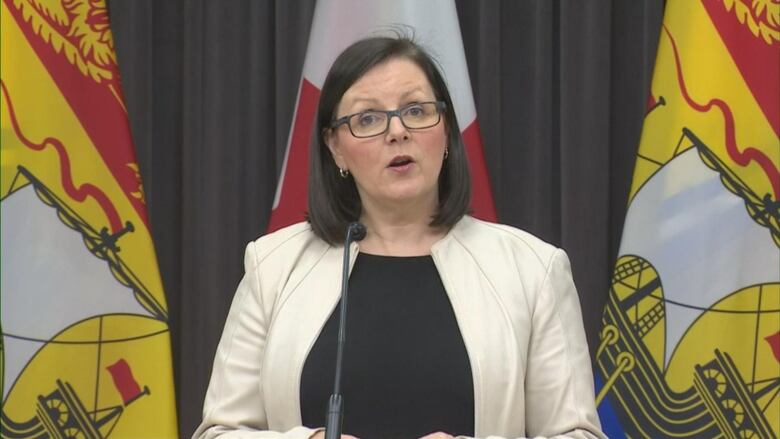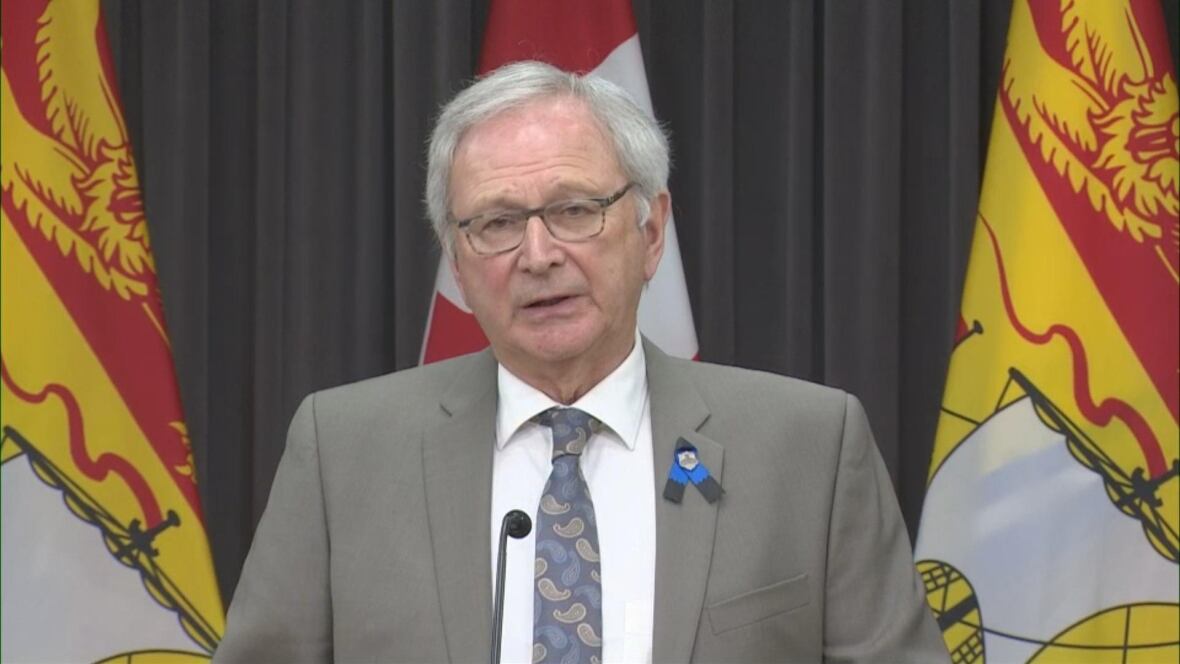N.B. COVID-19 roundup: No new cases for 4th day in a row
Dr. Jennifer Russell warns this is not the end

Latest
- Province provides iPads to nursing homes
- People without symptoms may eventually be tested, Russell says
- Cabinet committee works on strategy for slowly reuniting families
- Food bank use high but levelling off
- Fredericton homeless shelters avoid COVID-19 infections for now
- 60 volunteers sign up for 'Adopt a Grandparent' in Saint John
- What to do if you have symptoms
For the fourth day in a row, no COVID-19 cases were detected in New Brunswick, meaning only 14 active cases remain.
One person is still in an intensive care unit, and four other people are also in hospital.
At a briefing Wednesday afternoon, chief medical officer Dr. Jennifer Russell said no one has been admitted to hospital since April 12.
"We have been successful in this early stage," she said. "But this does not mean that we are in the clear."
New Brunswick has seen 13 people hospitalized since the outbreak began.
In the last 24 hours the province has conducted 260 tests. The total number of tests done in the province is 11,541.
Russell said physical distancing and emergency measures meant hospitals have not been overwhelmed, and health-care workers in New Brunswick have not seen the difficult conditions that other provinces are experiencing,.
But Russell said that's still possible.
"By staying home, practising physical distancing and maintaining proper hand hygiene, you have given us a chance to get ready for what comes next," she said.
She said all the measures that have been put in place will continue to be important.
"This is our new normal," she said.
"It's my hope that, having seen how this has enabled us so far to fare so well at this point, that you will carry on these practices in the weeks and months ahead."
Premier Blain Higgs said this case count is good news.
"I hope to be able to bring more good news in the days ahead."
On Tuesday Higgs said businesses should prepare to reopen, while also respecting physical distancing measures.
Higgs stressed that no date for the easing of restrictions has been set, but the all-party committee struck to guide the province through the pandemic will be discussing it this week.
"We need to bring New Brunswick back," said Higgs.
"We need to create a province that, you know, gets back to its economic viability and its lifestyle, and people feel that sense of purpose, and the benefits that exist from living in our province."
Province provides iPads to nursing homes
Premier Blaine Higgs said New Brunswick nursing homes will receive 480 iPads to help residents stay connected with their loved ones.
"We want to ensure these connections are not lost," he said.
The Department of Social Development will provide one iPad for every 10 residents, he said.
"Even after the pandemic is over these devices will be a useful tool to help residents stay connected," he said.
He said an app installed on the iPads will allow residents to have virtual doctor meetings.
Higgs said the iPads would be cleaned regularly, especially if they're going between one resident to another. He said having one iPad per resident "would not necessarily be effective because many would not be using it on a regular basis."
According to the the New Brunswick Association of Nursing Homes Inc. there are 68 licensed nursing homes in the province, serving around 4,700 people.
People without symptoms may eventually be tested, Russell says
With no new COVID-19 cases for the last four days, the chief medical health officer says the plan for continuing to gathering data through testing includes expanding the testing criteria.
"We will adjust as time goes on and that's part of the plan moving forward," Dr. Jennifer Russell said at her regular briefing Wednesday.
Russell has said that the level of testing being done now has to be kept up to maintain the accuracy of the data about the coronavirus in the province. Tests in the previous 24 hours totalled 260.
At present, the province tests people with at least two symptoms of the respiratory illness. No new cases have been confirmed in the last four days.
But Russell said Public Health will watch the test numbers to make decisions about expanding and changing the testing criteria. That may mean fewer criteria or fewer symptoms will be required to have a test done.
"And also then moving into testing people who are asymptomatic who don't actually have symptoms," she said at her regular briefing.
"That's a progressive approach and we will keep monitoring the numbers to make those decisions as things evolve."
Cabinet committee works on strategy for slowly reuniting families
Premier Blaine Higgs says he's aware that after they've practised physical distancing for five or six weeks, many New Brunswickers are anxious to see their families again.
"So that has been our focus over these last several days in relation to developing a recovery strategy and in many sectors and doing it in waves, so to speak."
Higgs said the staged approach is necessary so government can monitor the impact of allowing more movement and more access.
"In fact, we're reviewing a portion of that tonight," Higgs said, referring to a meeting of the all-party cabinet committee planned for Wednesday night.

The premier said that with no new cases of COVID-19, and few active cases, the numbers are encouraging. New Brunswick has had 118 cases so far.
"We're working very closely with Public Health to ensure that we do it in a methodical way that people can continue to respect the rules, and we do it so we won't have to go back."
Higgs said everyone wants to move forward and not move back and forth on restrictions.
"I'm encouraged with what has happened in the last two weeks."
Both Higgs and chief medical health officer Jennifer Russell had urged people not to visit or have family gatherings over the Easter weekend, and whether that happened would be known through test results over the next two weeks.
Now, the low count of cases and no new cases indicate people kept to the guidelines, Higgs said.
"It's a good indication that we should seriously be considering movement on several fronts, but to what degree is to be determined, and we are having those discussions today, tonight and tomorrow because we think the time has come to do something.
"We want to recognize the diligence citizens have had, and I'm very encouraged by the possibility."
Food bank visits rose in March but are levelling off
Some food banks in the province saw their intake rise dramatically last month over concerns about food insecurity caused by COVID 19.
But those numbers appeared to have stabilized, according to the head of the Oromocto Food Bank.
"The numbers went up in March everywhere," said Jane Buckley.
"I think it may have levelled off at this point."
Buckley said the Oromocto Food Bank helped 499 people in March 2019,but that number jumped to 838 in March 2020.
"There were a lot of people affected by COVID, people who were laid off," said Buckley.
She said a lot of people who sought help were from rural areas the food bank serves.
She credited the levelling off of food bank numbers to assistance programs, such as the Canada emergency care benefit, making people feel more secure in their ability to put food on the table.

Buckley said the food bank needed to implement new measures, such opening on more days and using curbside pickup, to protect volunteers and clients.
"It worked very well," said Buckley.
"People just backed their car up and loaded their trunk."
Buckley added that while financial donations have increased, food donations have decreased.
Fredericton homeless shelters avoid COVID-19 infections for now
The homeless community has been cited as a group particularly at risk of getting COVID-19, but at least in Fredericton, that group has been fairly safe.
Warren Maddox, the executive director of Fredericton Homeless Shelters, said that so far none of its clients have tested positive for COVID-19.
"We've been able to create a very good social distance between the beds," said Maddox.
Maddox said residents have adjusted well to the new routine under COVID-19, which includes strict cleaning and social distancing measures.

He said at the beginning of the pandemic it seemed that operating procedures were changing every 48 hours, and the shelters had been planning for the worst since February.
"A little planning goes a long way," said Maddox.
Residents were set to transfer to Fredericton High School, but that plan was changed at the request of residents.
"The residents were pretty clear … 'this is our home,'" said Maddox.
There is still a shelter at the Fredericton High School gym, which has bee used by the city's out-of-the-cold shelter during the outbreak.
60 volunteers sign up for 'Adopt a Grandparent' in Saint John
A Saint John man's plan to help people at risk of catching COVID-19 seems to be catching on.
Mikel Lester started his "Adopt A Grandparent" program two weeks ago and has already signed up about 60 volunteers.
The program is aimed at providing services, such as picking up groceries and running errands, to seniors who are demographically at a higher risk of catching severe cases of COVID-19.

Lester said the idea came to him when he noticed there were not as many seniors out and about as there used to be and his own respect for physical distancing had left him with some time on his hands.
It's not just groceries that people have been asking him to pick up.
"We've had requests of all sorts," said Lester, citing requests for books, sleep apnea equipment and a landline telephone.
The group has also begun to help front-line health staff who may miss store opening hours because of their work.
What to do if you have symptoms
People concerned they might have COVID-19 can take a self-assessment on the government website. Symptoms of coronavirus include fever, a new or worsening cough, and breathlessness, as well as sore throat, headache and runny nose. People with two of those symptoms are asked to:
-
Stay at home.
-
Immediately call Tele-Care 811 or their doctor
-
Describe symptoms and travel history.
-
Follow instructions.
With files from Information Morning Fredericton and Saint John
